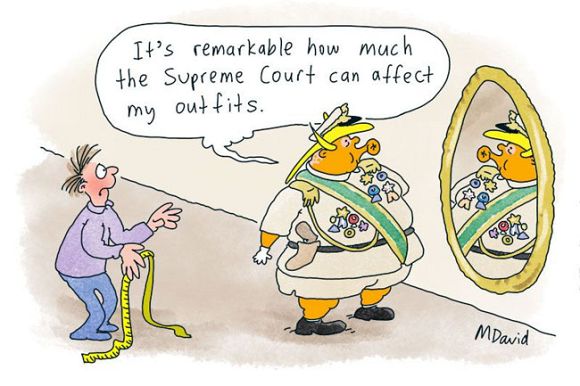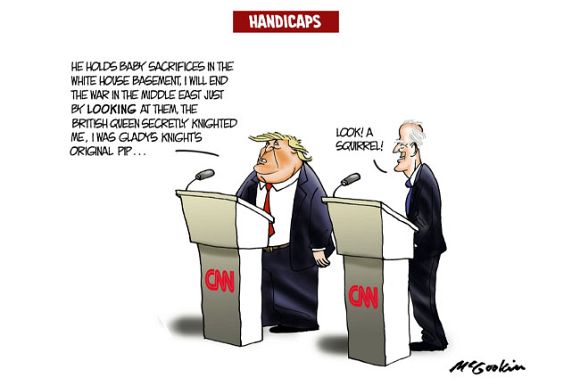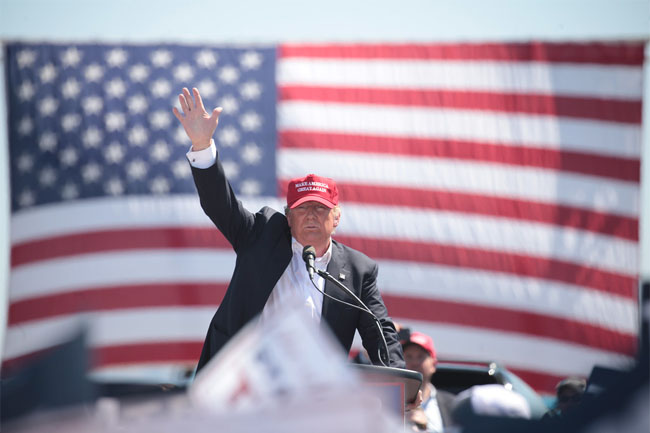With a history of exerting influence over the outcomes of elections, third-party 'spoiler' candidates could shift the U.S. Election in Donald Trump's favour.
George Grundy continues his series on the collapse of American democracy in the lead-up to the 2024 Election. Read the first part here, part two here, part three here, part four here, part six here, part seven here and part eight here.
ALTHOUGH THE POWER DYNAMIC of the Election has changed dramatically this last week, after President Joe Biden’s withdrawal and Vice President Kamala Harris’ stunning first few days, the existential threat to American democracy from Donald Trump’s cultish political movement remains very real. One of America’s major parties isn’t really enamoured of democracy anymore and is led by a delusional man who still claims to have won an election he clearly lost.
These days, Republican politicians, almost without exception, say that they will only accept this year’s election results if it’s “fair” (which is code for Trump winning). The simple phrase “yes, I will accept the election results” is noticeably absent.
Trump seems psychologically unable to accept defeat. He has poured scorn on the mechanics and outcomes of election after election after election. He even alleged voter fraud in the 2016 Election, which he won. Trump’s “big lie” has undeniable echoes of the dolchstosslegende myth perpetrated during the collapse of Imperial Germany in the 1930s and should Trump somehow take office again, his simmering rage will provide a source for the revenge that he so clearly wishes to take on his enemies.
As insidious as Trump’s undermining of democratic mechanics is the deliberate weakening of public faith in elections themselves — Trump and his Republicans are masters here. A recent survey showed that more than half of Trump’s supporters have no confidence that the results in this year’s election will be accurate. This is not an accident, but rather the result of a deliberate years-long strategy of misinformation and lies.
Manipulating voters into losing confidence in elections means that many might choose to vote for an overtly anti-democratic candidate. After all, if American elections aren’t to be trusted, what’s the point of democracy anyway? Perhaps even more darkly, if voters come to believe that elections are no longer an effective way of choosing political leaders, it primes them to consider using other, more direct methods to seize control.
So it's not just Trump’s psychology that prevents him from admitting defeat. It’s a political tactic. Suggesting electoral fraud before an election allows Trump to claim a form of victory when losses inevitably occur (“I told you it was rigged”). It feeds into his movement’s culture of grievance and ultimately may allow Trump to again incite his supporters to violence, should the 2024 Election not go his way.
Trump (and his Republican Party) regularly suggest that the only way he can lose is if the other side cheats. Only a man with utter disdain for democracy could come up with such a childlike view.
In the year following the 2020 Election, Republicans introduced 262 bills in 41 states, all aimed at sabotaging the normal operation of American elections. Voter ID laws were proposed, as were restrictions on where and when people can vote. Reforms were designed to take control over who counts the votes and when counting can be stopped.
The effort continues today, augmenting an even broader attempt to weaken institutions, erode faith in public bodies and make the very concept of democracy something Americans view as negotiable. Unable to win elections with ideas, Republicans have decided that rules are for losers, a political infection now metastasising through the entire civic body. If these efforts weren’t effective, Republicans wouldn’t spend so much time trying to implement them.
American elections are often decided by a small number of swing states and it’s here that Republicans have focused their anti-democratic efforts the most. Every aspect of the electoral process has been attacked in the hope of finding weakness — for example, in Wisconsin (a vital swing state), election officials in 2024 will not be able to start processing absentee or early votes prior to election day.
This might not seem like much, but if the Election is close and Wisconsin is in the balance, uncounted absentee votes (which tend to skew towards the Democrat Party) might give the early impression that Trump is ahead, allowing him to claim victory and try to stop the count — precisely what he attempted in 2020.
The media landscape has also changed dramatically since 2016. After briefly wavering in its support, Fox News has stuck with Trump and still spreads his daily torrent of bile and dishonesty, despite paying USD$787 million (AU$1.18 billion) in damages to an election voting machine manufacturer (for spreading lies about its technology).
The discovery process in the Dominion case revealed that Fox hosts secretly hate Trump and mock the idea that the 2020 Election was stolen, but we live in an age of short memories — Fox hosts do what Rupert Murdoch says they should do and with the ageing “dirty digger” moving to the sidelines, many expect his son Lachlan to take the network even further to the Right.
It's hard for anyone outside the Fox bubble to gauge just how much of a parallel universe the news station has created and the power Fox has over its millions of viewers. As the most successful cable network in America, Fox often acts as an unofficial arm of the Republican Party. Fox hosts appear on stage with Donald Trump at rallies, visit Trump at his home, talk to him before their shows and tailor their editorial coverage to fit his demands.
Fox’s evening show presenters like Sean Hannity and Laura Ingraham (and former host Tucker Carlson) peddle hateful, upside-down and often bonkers news values, and frame and repeat stories in a relentlessly one-eyed, intellectually dishonest fashion. Many Fox viewers have fallen under the station’s thrall and have somehow been convinced that Donald Trump is, in fact, a moral and intelligent man, whose first term was a triumph.
Fox spreads a form of social madness, misleading its viewers into believing things like how Democrats support “post-birth abortions” (a non-existent procedure, where an infant is killed after being delivered naturally). Just imagine that you actually believed such a thing — wouldn’t your worldview quickly form around the idea that Democrats are almost satanically evil? It’s crazy, but one should not underestimate the credulousness of millions of Americans.
Social media was a huge factor in the outcome of the 2016 Election and changes in the online world are hardly encouraging entering the new electoral cycle. Facebook and Instagram algorithms increasingly limit political comment, instead providing users with echo chambers and exposure to “influencers” who reflect or amplify existing biases. TikTok and Snapchat have captured the youth market and often promote Right-wing voices over others.
Most worryingly, X (formerly Twitter) is now owned by Elon Musk, the richest person in the world. Musk has revealed himself to be a profoundly peculiar man who amplifies conspiratorial and hard-Right opinions on Republican-friendly matters such as the border and abortion and is such a “free speech absolutist” that he fires dissenting employees and suspends the accounts of journalists who criticise him.
Musk has at least 11 regulatory battles in progress with the current Administration — a Trump win (and subsequent relaxation of regulation controls) would likely offer Musk substantial financial gains.
Trump, in turn, is now reportedly considering offering Musk an advisory role in the White House. It’s not hard to see how the two men align so well, nor who Musk will be supporting in 2024. One of the world’s great public spaces for political discussion is now under the control of a billionaire (with 184 million followers), who is happy to control access to information and unashamedly supports Donald Trump.
Third-party “spoiler” candidates have a long history of exerting influence over the outcome of American elections, mostly in favour of Republican candidates. Whilst the idiosyncratic campaign of Ross Perot gifted Bill Clinton the White House in 1992, Ralph Nader almost certainly changed the result of the 2000 Election – one of the most consequential in modern American history – from President Al Gore to George W Bush.
Jill Stein, the curiously Russia-intersecting Green candidate, made a perhaps decisive intervention in the 2016 Election. She is standing again in 2024.
In a nation so evenly divided, where elections often come down to a matter of a few votes in a select group of swing states, a third-party candidate need only pick up a small number of percentage points to fundamentally change the entire direction of the country. And in 2024, the field is more crowded than ever before.
Lead among the list of political outliers is anti-vax conspiracy peddler Robert F Kennedy Jr, currently polling at a result-influencing 9.8 per cent nationally. Kennedy is worth paying attention to, as polls indicate much of his support might draw from potential Harris voters. Although some theorise that Kennedy might instead take more Republican votes than Democrat, the extremism of Donald Trump seems to leave only centre and centre-Left voters available and in play.
Curiously, businessman Tim Mellon, who is Kennedy’s biggest benefactor is also a major Trump donor, leading many to suggest a form of political conspiracy. Kennedy staff members have openly stated that their priority was preventing Joe Biden (and now presumably Kamala Harris) from winning a second term, so Kennedy’s campaign should be considered an unofficial offshoot of the Trump team.
Whoever emerges with momentum at the end of the summer, it’s likely that a third-party candidate will increase the chances of a second Trump Presidency this November.
So, with traditional media fractured, social media sites owned by a nefarious billionaire and a third-party spoiler apparently in Donald Trump’s pocket, the 2024 Election is not just a poll on voters' political inclinations, it’s likely to be a profound test of the broad functioning of American society.
This election needs to be viewed in its proper context and like it or not, we are going to discover:
- whether America retains enough of a free and independent media that the public is informed of what a Trump presidency would mean, and not so consistently misinformed (by certain broadcasters) that large swathes of the population believe provably false things;
- if America is able to withstand malevolent actors trying to exert influence from abroad;
- whether voting can take place in a safe and secure environment when one major party has previously threatened and harassed election workers, and prompted heavily armed members of the public to appear at polling sites to “monitor” voting;
- if Republicans have been successful in their efforts to undermine the function of democratic elections;
- if the use of a third party can be weaponised to assist one candidate in winning;
- if America can conduct an election in which the leader of one major party only accepts the results if they win; and
- if any disputes to election results can be resolved quickly by a judiciary in which the top court in the land is heavily politicised and on which one candidate appointed one-third of the judges.
This article will be continued next Friday, 2 August.
Read part one of ‘America's gathering storm’ here, part two here, part three here, part four here, part six here, part seven here and part eight here.
George Grundy is an English-Australian author, media professional and businessman. You can follow him on Twitter @georgewgrundy.
Related Articles
- Trump's immigration policies a potential human rights violation
- Media has normalised Trump's bullying — it's time to take control
- Media enabling Trump's mission to destroy democracy
- Logic shows Trump cannot win another term, but don’t relax just yet
- CARTOONS: Trump picks new running mate
 This work is licensed under a Creative Commons Attribution-NonCommercial-NoDerivs 3.0 Australia License
This work is licensed under a Creative Commons Attribution-NonCommercial-NoDerivs 3.0 Australia License
Support independent journalism Subscribe to IA.
















